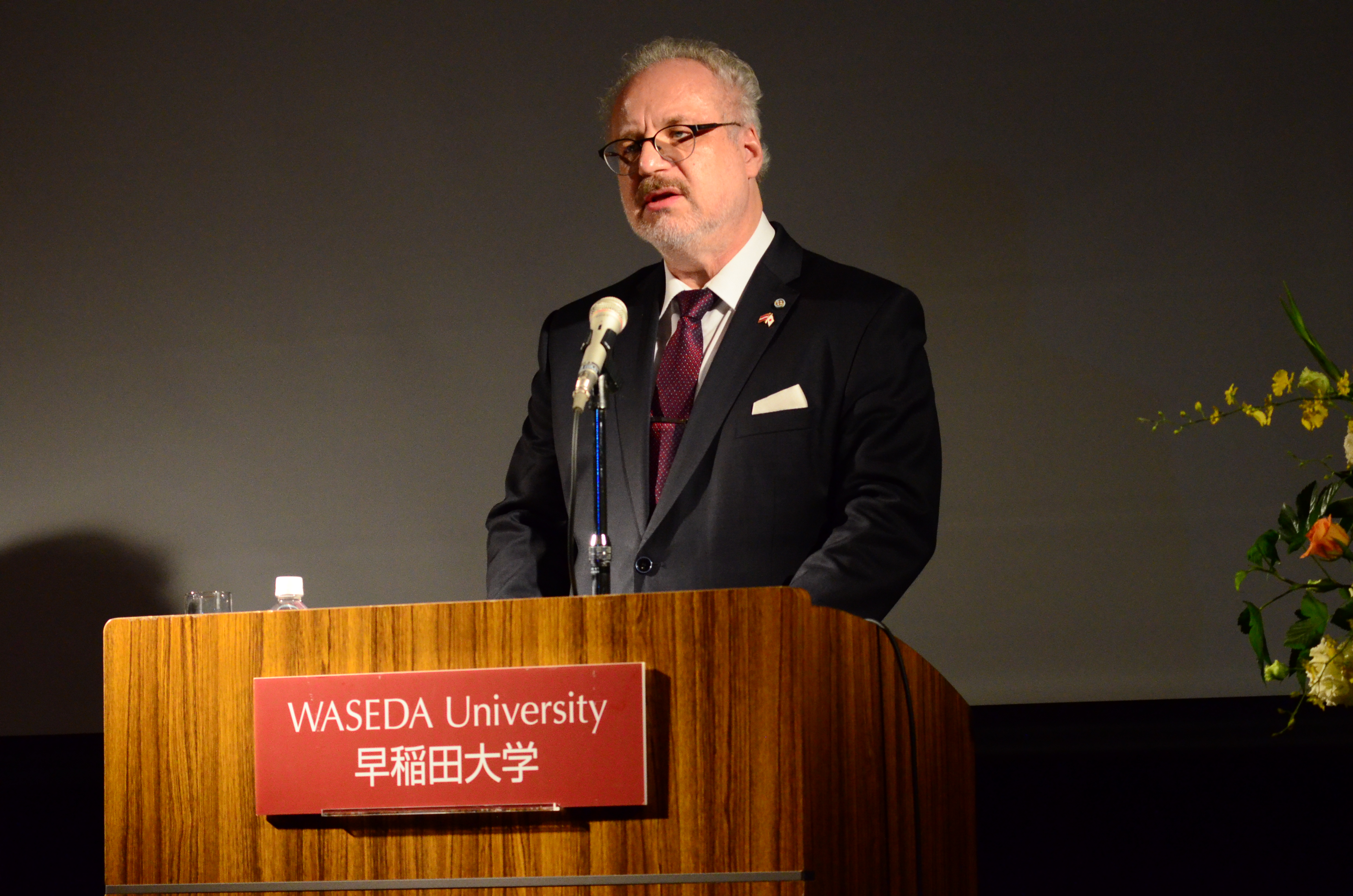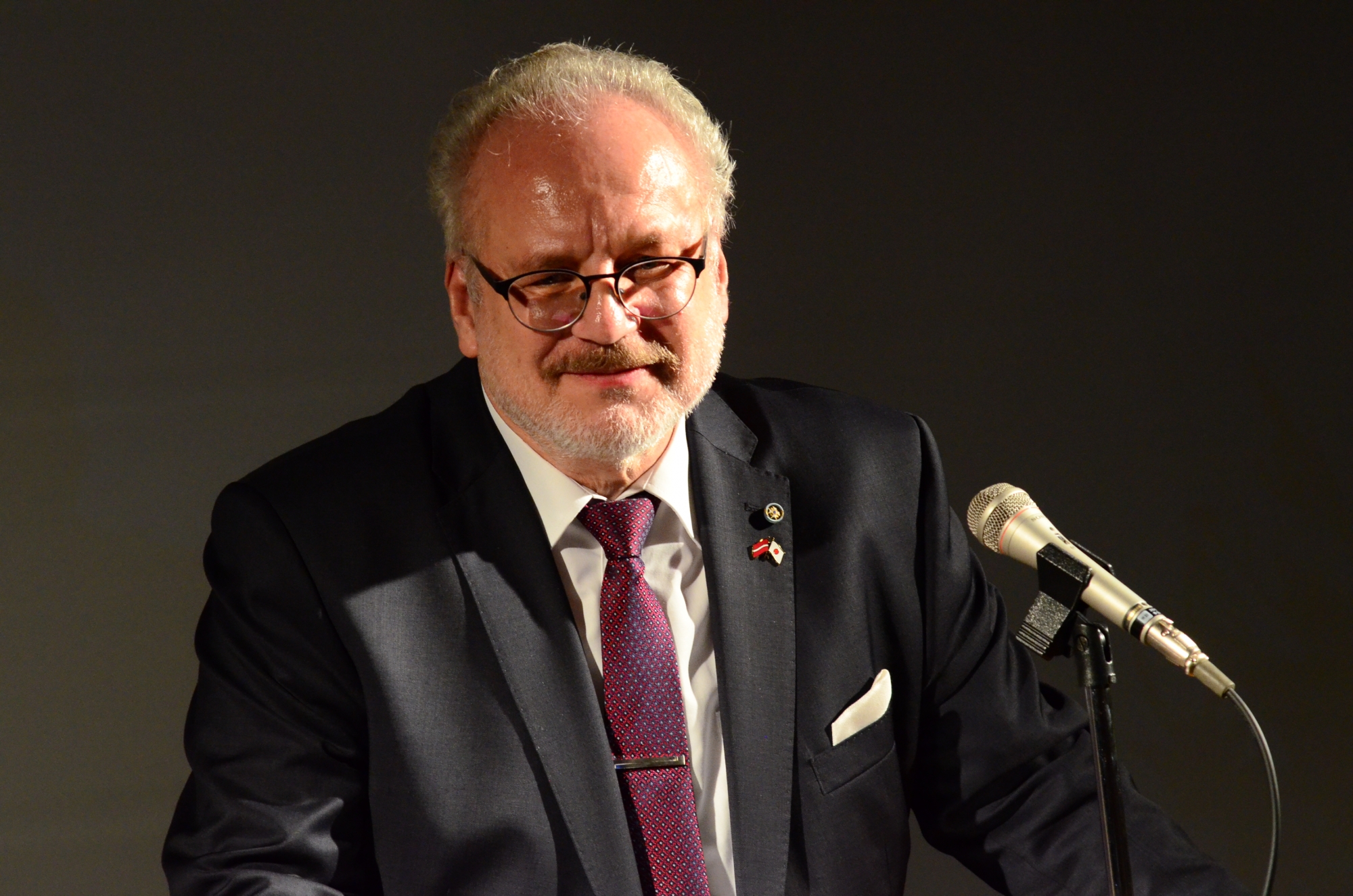“History has no end and democracy will always be threatened,” says Latvia’s President Levits
Thu, Nov 14, 2019-
Tags
“Democracy is not helpless,” said Latvia’s President Egils Levits. On October 23rd, the president visited Waseda University to deliver a talk on “Latvia’s perspective on challenges in modern democracies.” A European judge at the European Court of Justice since 2004, he emphasized the importance of a “self-defensive” democracy—one that can protect itself from destruction by means of guaranteed freedoms— and use legal universal frameworks.

A packed house in Okuma Tower welcomed President Levits, First Lady Andra Levite and other personnel from the Embassy of Latvia in Japan. After an introduction by Waseda’s International Office and the MC for the event, President Levits gave a speech about different aspects of democracy: consumerism, populism and big data as threats to democracy; the importance of civic duty in upholding it; and legal frameworks to keep it intact.
The president has a distinguished career in law and political science. He wrote the Preamble or Introduction to the Constitution adopted in 2014 and has won numerous awards for his service— many of which commended him for jurisprudence. In 2016, he won the Letter of Recognition by the Cabinet of Ministers on outstanding contribution to the development of jurisprudence and legislation, and in 2018 an award by the Cabinet of Ministers “for significant contribution to the development of the Latvian judicial system, the strengthening of democracy and the rule of law, and scientific achievements in justice.”
Since the president assumed his role in July 2019, he has advocated for multilateral cooperation to protect democracy and ensure global peace and security. “The United Nations is and must remain the central forum for multilateralism and a rules-based global order,” said President Levits at the lecture, who had also emphasized it at the 74th United Nations General Assembly.
In his speech, he praised democracy as the most high-functioning—albeit flawed—system the world has today. “Democracy is far from perfect, but it is the highest political achievement of mankind,” he said. “Modern democracies have gone through constant improvements and upgrades…we have seen constitutional democracies reach higher levels of prosperity and growth than undemocratic states.”
However, President Levits, who was an active and strong advocate for the restoration of independence of Latvia from 1989 to 1991, is also keenly aware of democracy’s fragility. “Classic theories of democracy are based on an assumption that citizens are capable of thinking critically and making rational decisions,” he said. He admitted that in modern times, civic duty has given way to self-interests. The manipulation of technology and overwhelming developments in information and communication technologies have made critical thinking challenging, he said. While he championed freedom that aligns with democratic principles, he warned that untethered freedom could hurt democratic ideals: “People often tend to take democracy and its advantages for granted, as a permanent fixture we all benefit from.”
Globally, the president believes that Latvia can foster relations to advance universal values. He has previously served as Latvian ambassador to Germany, Austria, Hungary, and Switzerland, as well as deputy prime minister, minister of justice and member of parliament. He said although Latvia is a small country, it is still an EU member state and would use its platform to cooperate with different countries. As for Japan, he said he would work with its government to address issues such as climate change.
The president of Latvia emphasized the importance of preserving democracy through principles. A lawyer and political scientist, he stressed the importance of using legal frameworks and multilateral cooperation to protect democracy. His speech was as pragmatic as it was hopeful, highlighting the threats to democracy but also acknowledging how civic duty could enhance it, depending on how one uses freedom. “Democracy is the only form of government that learns from its mistakes and constantly improves itself,” said President Levits.
*This article was written and contributed by the following student.
Student Contributor
Marina Yoshimura (4th Year Student)
School of International Liberal Studies














